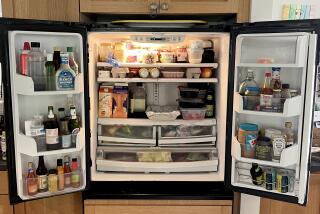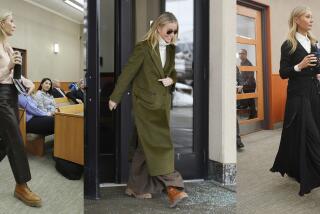Ad Push Has ‘Simple’ Written All Over It
- Share via
NEW YORK — With a ballet class, physical therapy and dinner with a guy named Mark on her schedule, dancer Kate Hunter is relaxed--although she also has to buy leg warmers, check on a flight to Paris and buy flowers for a friend.
How could anyone be so unfazed by this hectic schedule? It must be the Palm V electronic note pad Hunter clutches--or at least that’s the message 3Com Corp. hopes to convey in this advertisement emblazoned with the words “Simply Palm.”
The ubiquity of the word “simple” in advertising may not be new, but marketers say it is becoming more prominent as Americans try to restore some calm to frenetic lifestyles and are less concerned with acquiring things. Marketers selling everything from furniture to clothes to bottled water are trying to convince consumers that their products will help bring simplicity back to life.
“It’s definitely a trend that almost every advertiser is going after,” said Christine Carville, associate publisher of Simplicity, a magazine being launched early next year. Simplicity will promote the idea that buying fewer things leads to less complicated living.
The narrator of a Buick Park Avenue television commercial, for example, intones: “There comes a point where anything more is simply more.” And J. Jill, which sells upscale women’s clothing and accessories in catalogs and online, has dubbed its fall 1999 offerings “simple pleasures.”
Ikea furniture, Aveda beauty products and Evian water have already been successfully marketed as fashionably uncomplicated, Carville said.
*
But to some, the selling of simplicity is insulting.
“There’s probably not any one product you’re going to buy that’s going to simplify your life,” says Dave Wampler of Trout Lake, Wash., founder of the Simple Living Network, a Web site that advocates a more simple lifestyle.
“Any time you buy something, you have to work a little harder to get the money to pay for it,” he said.
Millions of Americans have shown interest in the idea that less is more. They’re reading books such as Duane Elgin’s “Voluntary Simplicity: Toward a Way of Life That Is Outwardly Simple, Inwardly Rich” and Sarah Ban Breathnach’s “Simple Abundance.”
Simplicity devotees meet in small groups or online chat rooms to pass along money- and timesaving tips. Most of all, they try to resist making impulse purchases. Some anti-consumption devotees observe “Buy Nothing Day” on the day after Thanksgiving, when millions of Americans crowd into stores for the start of the holiday shopping season.
But for others, simplicity is a reason to buy. A survey published in a recent issue of Advertising Age magazine found “simple” to be the fifth most important brand attribute for American consumers 36 to 69.
And so Simple Shoes Inc., which sells suede sneakers and clogs, expects sales this year to exceed $15 million as it appeals to shoppers fed up with the consumption obsession.
“Simple consumers want something that’s hip and understated,” said Ruth Davis, vice president of marketing for Simple Shoes. “The brand says what I’m about as a person inside.”
Whether any one product actually helps ease the burdens of modern life can be debated, but some companies claim to have indeed made people’s lives less complicated.
*
California Closets Co.’s ads tout home organization systems that can “simplify your life.” One customer, Mike Robbins, with the help of a company representative, threw away about a fourth of his possessions. That and the installation of a new closet in his Anchorage, Alaska, home allowed Robbins to declare his life simplified.
Jan Schlesinger, director of marketing for California Closets, based in San Rafael, Calif., said, “Our business isn’t about wooden poles and widgets and shelves and drawers. It’s really a lifestyle.”
To that end, the company produces Hush magazine, which features articles and photographs about simplicity in clothes and food as well as closets.
Similarly, Time Warner plans to start a magazine, Real Simple, in March. Publisher Alexander Sareyan said, “it’s not a move-to-the-woods . . . type of thing at all.” The magazine will target those who believe “the measure of a life well-lived is not about stuff anymore.”
Yet even if readers of Real Simple, Simplicity and Hush are inclined to eschew consumption, potential advertisers say they are nonetheless eager to reach this demographic.
As Simple Shoes’ Davis bluntly explains: “I definitely want to capitalize on the whole simplicity movement.”
More to Read
Inside the business of entertainment
The Wide Shot brings you news, analysis and insights on everything from streaming wars to production — and what it all means for the future.
You may occasionally receive promotional content from the Los Angeles Times.










